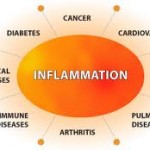 This recent article update seemed to have hit a nerve for some. Mostly because not only are there so many of us out here suffering from, or trying to control high blood pressure, but also because everywhere you turn now the buzzword seems to be ‘Inflammation.’
This recent article update seemed to have hit a nerve for some. Mostly because not only are there so many of us out here suffering from, or trying to control high blood pressure, but also because everywhere you turn now the buzzword seems to be ‘Inflammation.’
The small post from Sunday morning referenced recent articles that highlighted studies (mostly in mice and rats) that focused on hypertension and inflammation.
The inflammation in the hypertensive rats and mice was all over the board. Renal, arterial, hepatic, pleural and arthroscopic inflammation was studied as it affected the blood pressure for the little critters, and eventually they looked at the effects of using antioxidants to reduce the inflammation.
The general results were that if inflammation can be reduced, then hypertension would improve.
This isn’t necessarily new science, but it does highlight the point that a lot of what doctors try to do for people to get their blood pressure down doesn’t address the key issue of stress on the body.
Think about it…what would cause renal inflammation? Kidneys under some kind of stress are going to become inflamed.
Same for hepatic inflammation. A stressor-whether as an infection or simply chemical stress such as that which would be induced by too much drinking- will cause inflammation.
The inflammation is the effect of the stress. Follow those dominoes as they fall and you inevitably wind up in the land of chronic hypertension.
Simply asking someone to give up table salt isn’t going to necessarily help someone who doesn’t have a sodium problem but does have high blood pressure.
The point of publishing the smaller article that highlighted inflammation as a problem for hypertension was basically to reinforce that throwing pills at a problem or taking away the salt shaker isn’t always the most effective way to correct the problem.
Adding powerful antioxidants into the diets of most people who suffer chronic pain, hypertension, and other complications from disease processes has proven for many decades to be one component in a comprehensive approach to treating or even curing those diseases.
Studies abound with extolling the virtues of healthy living, but a lot of times people can miss the real take-aways from that research because the technical jibber-jabber is so hard to decipher.
That’s why when we post smaller articles like the one from Monday, and the longer blogs like today’s, we like to highlight the basic study findings and see what catches fire. From there, if we need to look at something in more detail we can certainly do that based upon reader questions.
As I read some of the studies, I sometimes need the medical dictionary and a chemistry book nearby. We generally don’t use phrases like “immunosuppression attenuates hypertension” in general conversation, nor do we sit around and have online chats about the “immune response in T cell hybridomas.”
However, we do like to at least look over the findings of the different research, whether we seek these studies out or they pop up in the news.
Then, a general summary or key piece of the study can be highlighted, which helps to reinforce our position on what we like to tell our readers.
In the case of the inflammation article, it basically reinforces that hypertension isn’t always going to improve if salt is removed from the diet. Other causes must first be looked at and sometimes doctors just don’t do that.
It would be hard for them to when they spend less than 5 minutes in a room with you, anyway. Got high blood pressure? Here’s a pill. Next patient, please…
But for those of us who are always seeking answers and look to proven methods and natural alternatives, that just isn’t going to cut it for very long.
For a natural alternative to eliminating high blood pressure that works and addresses the stress factor naturally, see my Hypertension No More program today.
Warm regards,
Christian Goodman
El331005

 Multiple Sclerosis
Multiple Sclerosis Banishing Bronchitis
Banishing Bronchitis Gum Disease Gone
Gum Disease Gone Overcoming Onychomycosis
Overcoming Onychomycosis Neuropathy No More
Neuropathy No More The Prostate Protocol
The Prostate Protocol Brain Booster
Brain Booster
 Ironbound
Ironbound
 Solution for Shingles
Solution for Shingles
 The Bone Density Solution
The Bone Density Solution
 The Ultimate Healing Protocol
The Ultimate Healing Protocol
 The Parkinson's Protocol
The Parkinson's Protocol
 The Chronic Kidney Disease Solution
The Chronic Kidney Disease Solution
 Overthrowing Anxiety
Overthrowing Anxiety The Fatty Liver Solution
The Fatty Liver Solution The Hypothyroidism Solution
The Hypothyroidism Solution
 The End of Gout
The End of Gout The Blood Pressure Program
The Blood Pressure Program
 The Oxigized Cholesterol Strategy
The Oxigized Cholesterol Strategy
 Stop Snoring And Sleep Apnea Program
Stop Snoring And Sleep Apnea Program
 The Arthritis Strategy
The Arthritis Strategy The Vertigo & Dizziness Program
The Vertigo & Dizziness Program The 3-Step Diabetes Strategy
The 3-Step Diabetes Strategy Hemorrhoids Healing Protocol
Hemorrhoids Healing Protocol The Erectile Dysfunction Master
The Erectile Dysfunction Master Weight Loss Breeze
Weight Loss Breeze The IBS Program
The IBS Program The Insomnia Program
The Insomnia Program The Migraine and Headache Program
The Migraine and Headache Program The Neck Pain Solution
The Neck Pain Solution The Menopause Solution
The Menopause Solution The Ejaculation Master
The Ejaculation Master The TMJ Solution
The TMJ Solution The Acid Reflux Solution
The Acid Reflux Solution The Fibromyalgia Solution
The Fibromyalgia Solution The Psoriasis Strategy
The Psoriasis Strategy